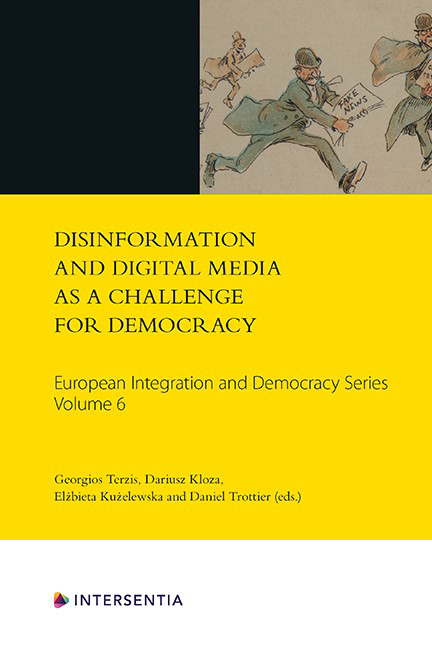Book contents
- Frontmatter
- Foreword: Fooling All of the People All of the Time: Democracy in the Age of Fake News
- Introduction: ‘They All Hear “Ping” at the Same Time’
- Contents
- List of Abbreviations
- List of Contributors
- PART I THEORETICAL APPROACHES TO AND THE CONCEPTUALISATION OF DISINFORMATION
- PART II EXPERIENCE OF DEALING WITH DISINFORMATION
- PART III SOLUTIONS TO DEAL WITH DISINFORMATION AND THEIR CRITIQUE
3 - Information and Disinformation and the Transformation of Modern Democracy: From Media Bias through the ‘Echo Chamber’ and the ‘Filter Bubble’ to Fake News
Published online by Cambridge University Press: 26 May 2021
- Frontmatter
- Foreword: Fooling All of the People All of the Time: Democracy in the Age of Fake News
- Introduction: ‘They All Hear “Ping” at the Same Time’
- Contents
- List of Abbreviations
- List of Contributors
- PART I THEORETICAL APPROACHES TO AND THE CONCEPTUALISATION OF DISINFORMATION
- PART II EXPERIENCE OF DEALING WITH DISINFORMATION
- PART III SOLUTIONS TO DEAL WITH DISINFORMATION AND THEIR CRITIQUE
Summary
INTRODUCTION
Changes in modern democracies take place in many directions determined by institutional factors, historical processes and economic, social, religious and cultural conditions. In these changes it is often difficult to find many common features, conditions or regularities. The issue and threat that all democratic states without exception have to deal with is the problem of reliably informing citizens about political processes. The classics of modern democracy, to mention only Robert Dahl, Joseph Schumpeter and Giovanni Sartori, emphasised that a citizen is needed for the functioning of this political system, especially in the face of political elections and referendums, who has reliable and if possible full information about the political offer and activities and decisions of political actors. There is currently no dispute in relation to the fact that information is the basis for making decisions in democracy. However, both for the rulers and contenders for government, as well as state and non-state players in the international arena, impact in the area of information becomes the most important, not to say the key imperative of action. We have no doubt at present that it is in the area of information creation that the greatest efforts to achieve political and economic goals have been located in recent decades that affect all processes in modern democracies and democratic systems as a whole.
It seems that the fastest-growing information industry, which also has the greatest impact on the knowledge and orientation of citizens, is the media sector. Although only in the opinion of extreme idealists has the media ever remained fully objective and independent of owners, rulers and economic influences, nowadays the processes of informing citizens are increasingly deliberately isolated from the truth based on facts, aiming at simplifications and interpretations adapted to the intentions of broadcasters. This process is progressing more dynamically. It is influenced by economic, political and technological conditions. Disinformation processes no longer rely only on the biased presentation of political processes, but tend to lock the citizen in an information bubble and address completely manipulated messages towards them so that the concept of truth loses any value.
- Type
- Chapter
- Information
- Publisher: IntersentiaPrint publication year: 2020



